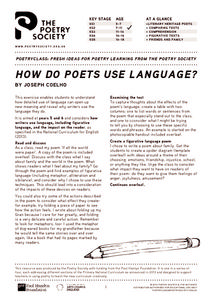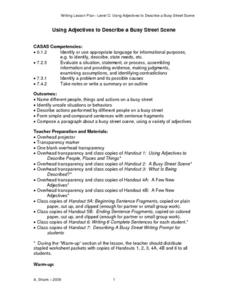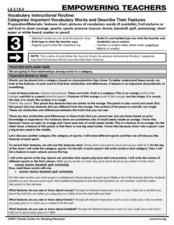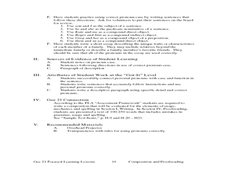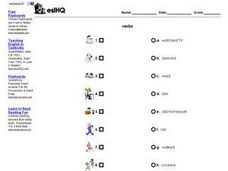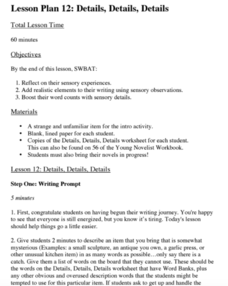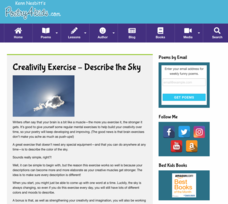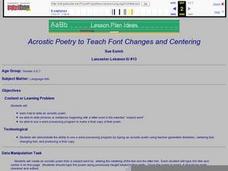Curated OER
Word Association Poetry with Visual Thesaurus (or Not)
Young poets get inspiration and guidance for making word association poems with the Visual Thesaurus. Your class could complete this project with nothing more than a pencil and paper as well. A nice one-off for a substitute during your...
Meadows Center for Preventing Educational Risk, University of Texas at Austin
Lesson 10 - Compound Words
Individually, words have power, but when added together, they can take on a whole other level of meaning. Readers learn about compound words in the 10th of 17 lessons of the Word Recognition and Fluency series. A script provides guidance...
Curated OER
Easter Egg Surprise
Young readers describe objects by using describing words. After reviewing the five senses, they use their senses to gain information about an object. Then as homework, they write three descriptive words about a mystery object and place...
Poetry Society
How do Poets Use Language?
Why do writers choose the language they do? Here's a resource that has the poet himself answer that very question. Joseph Coelho explains why he chose the words and images he used in his poem, "If All the World Were Paper."
Curated OER
High Frequency Words Worksheet
Use this high frequency words worksheet to help spellers write down the ten words with the -ur sound and complete ten fill-in sentences with the correct word.
Curated OER
Using Connectives Correctly
After delving into the proper use of conjunctions, learners write their own stories focusing on using connecting words. First, they discuss the different types of conjunctions. Those include conjunctions used to add further information,...
Saint Paul Public Schools
Using Adjectives to Describe a Busy Street Scene
What just happened in the street? After several introductory activities about adjectives and description, pupils use all that they have learned to compose a paragraph about a hectic intersection.
Curated OER
Possessive Pronouns
This instructional activity reviews types of pronouns, provides a list of possessive pronouns, as well as prompts for writing original sentences using 14 different possessive pronouns. Plus, participants put possessive pronouns in their...
Curated OER
Vocabulary: Categorize Important Vocabulary Words and Describe Their Features
Just like sports, different words have different features that help us understand or spell them. Learners categorize various sports based on their similarities and differences, then they use that strategy to categorize various words....
Curated OER
Word Processing Can Be Lots of Font!
Explore the basic functions of word processing programs. Young computer users practice deleting, inserting, and changing text. They experience using computer functions as they copy a required poem and complete various computer exercises....
Curated OER
Using Personal Pronouns Correctly
Complete personal pronoun practice activities. Pupils use correct personal pronoun form in sentences the teacher writes on the board. They review the function of a pronoun and the various cases and practice placing personal pronouns by...
Curated OER
Know your roots!
Looking at an image of plant systems with their roots in the ground, learners determine which would be the most or least difficult to pull. They write short sentences describing which plant they chose and why. Intended for 3rd or 4th...
Curated OER
Word and Picture Match-- Verbs
The focus of this ESL worksheet is on matching verbs and pictures. Students analyze seveb pictures that depict people engaged in various activities, and match each picture to the verb that describes it.
Curated OER
Using Descriptive Words
Second graders focus on how descriptive words help them see, feel, and hear a story better. They listen to a read aloud of Angela Johnson's, "The Leaving Morning," while giving a thumbs up signal each time they hear a "sense or how"...
Curated OER
Details, Details, Details
Writing can become one-dimensional if authors don't involve all their senses. First, scholars observe a strange object which, ideally, they can touch and even smell. Without using certain words (you can create a list or have the class...
Poetry4kids
Creativity Exercise - Describe the Sky
Scholars stretch their writing muscles with an exercise that asks them to describe the sky using similes and metaphors.
Curated OER
Descriptive Writing Using the Book Rumpelstiltskin
Use the fairy tale Rumpelstiltskin to teach your third grade class about descriptive writing. Following a teacher read-aloud of the story, the class brainstorms a list of adjectives describing the main character. Students use this list...
Curated OER
"Snapshot" Exercises & Sensory Detail Word Bank
Read a sample of creative descriptive writing to your science class. Discuss how writing can be used to record and communicate observations that scientists make. Reading selections and thought-provoking questions are suggested. Also...
EngageNY
Using Trigonometry to Determine Area
What do you do when you don't think you have enough information? You look for another way to do the problem! Pupils combine what they know about finding the area of a triangle and trigonometry to determine triangle area when they don't...
PBS
Using Primary Sources: Wide Open Town
A picture speaks a thousand words, no matter how old! Scholars use political cartoons from the era of Prohibition and the Temperance Movement to analyze what, a primary document (in this case, a bootlegger's notebook) is telling them...
Curated OER
Acrostic Poetry to Teach Font Changes and Centering
Students engage in a discussion about how to write an acrostic poem. They demonstate the ability to use a word processor by typing an acrostic poem by following instructions. Word processing skills such as, centering text, changing font,...
EngageNY
Word Problems
Use several skills to solve word problems leading to systems of equations. Scholars define variables and write equations to model situations described within word problems. Pupils solve the resulting system of linear equations using...
Curated OER
The Use of Language in "I Know Why the Caged Bird Sings"
Readers of I Know Why the Caged Bird Sings are asked to craft an essay in which they compare how Maya Angelou uses figurative language to depict herself and Mrs. Flowers.
Florida Center for Reading Research
Vocabulary: Word Meaning: Know or No
Activate the prior knowledge of young scholars as they expand their vocabulary with this language arts activity. Given a deck of cards containing new vocabulary words, learners sort them into four categories, from Don't know the meaning...





